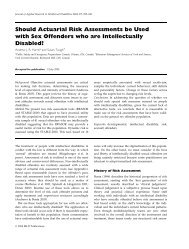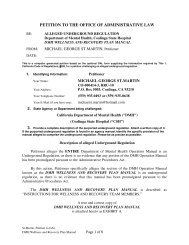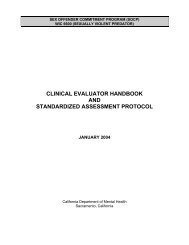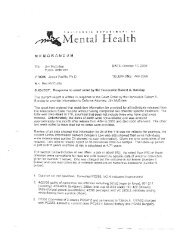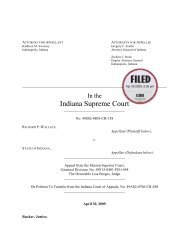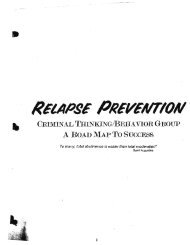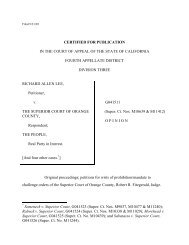Therapeutic Jurisp & Sexual Predator Laws - Defense for SVP
Therapeutic Jurisp & Sexual Predator Laws - Defense for SVP
Therapeutic Jurisp & Sexual Predator Laws - Defense for SVP
You also want an ePaper? Increase the reach of your titles
YUMPU automatically turns print PDFs into web optimized ePapers that Google loves.
Not content to simply establish that the defendant has been convicted of the requisite single offenserequired by the law, n68 prosecutors have refused to accept defense counsel's offer to stipulate to the priorconviction(s) and, instead, relitigate the prior sexual offense(s) <strong>for</strong> which the individual has beenconvicted. n69 The government may call past victims and have them testify again about the originalcrime(s). n70 Needless to say, testimony by the victim of a sex crime can easily anger a jury.Then the prosecutor will present an expert (usually one who only testifies on behalf of the prosecution)n71 who has concluded that the defendant is a sexual predator who suffers from a "mental abnormality" or"personality disorder" and is "likely" to commit another serious sex crime if he is released. n72 Afterhearing emotional testimony from victims n73 and an "expert" who has predicted that the defendant islikely to commit another serious sex crime if he is released, in most cases juries will play it safe andcommit the defendant. n74 (The subtext here is [*386] obvious and persuasive: If you release this personand he commits another sex crime, you, ladies and gentlemen of the jury, are responsible.)Not surprisingly, the state has won all but two of the cases it has taken to a full trial in Washington State.n75 If the government loses a case, it can simply retry it. n76 Because the Supreme Court has ruled thatthe predator law is "civil," and not "criminal," there is no double jeopardy protection against a retrial. Thisgives the government ample opportunity to strengthen its case and to use a different strategy on retrial.C. Secure Confinement ParamountIndividuals committed under the Washington statute are placed in a secure wing of a maximum-securityprison. This facility is called the Special Commitment Center ("SCC"). Even though it is nominally a "civilcommitment law," the Washington predator statute expressly prohibits these individuals from being held ina "state mental hospital." n77 Employees of the state Department of Social and Health services ("DSHS")run the SCC. Nonetheless, in many ways the SCC is run just like a prison. And, in many ways, SCCresidents are treated just like prisoners and, in some cases, even worse.From August 1990 to April 1998, the SCC was located in a wing within Monroe Penitentiary, a maximumsecurity prison in Monroe, Washington, run by the state Department of Corrections ("DOC"). n78 AtMonroe, electronic gates, high walls with razor wire on top, guard towers, and other heavy securitymeasures were in place. n79 An Assistant Attorney General has advised that guards may use deadly[*387] <strong>for</strong>ce to prevent any person civilly committed as a sexual predator from escaping. n80 In 1995 astate court found that, overall, SCC residents at Monroe do not have a "wider range of privileges" thanDOC prison inmates. n81In April 1998, the SCC was relocated to its own building within McNeil Island Correctional Center, amedium security prison located on McNeil Island. n82 Its superintendent has described the SCC atMcNeil as "a closed custody facility." n83 McNeil Island is near Steilacoom, Washington and isaccessible only by ferry. n84 Escape from McNeil is even more problematic because of the extremely coldwater and strong tidal currents of Puget Sound. n85 Even though escape from McNeil is very difficult,SCC residents have not been allowed off the unit. n86 Because the island is accessible only by ferry, visitsby family and by attorneys are difficult to arrange. n87 [*388]Prison guards from the DOC conduct frequent "walk-throughs," n88 and the DOC provides medical careto the residents as well as food services. n89 Over the objection of the SCC Superintendent and at theinsistence of the DOC, residents, unlike other civilly committed patients, are shackled and dressed in prisonjumpsuits when taken to the infirmary. n90 Conjugal visits, though af<strong>for</strong>ded prisoners in DOC facilities,are not af<strong>for</strong>ded residents at SCC. n91 Discipline (such as lockdowns or loss of outdoor exerciseprivileges) <strong>for</strong> infractions is called "behavioral intervention." n92 The SCC superintendent has determinedthat residents are not entitled to "due process" hearings of any sort because this is "treatment" notpunishment. n93 Thus, by characterizing discipline as treatment, SCC has avoided providing residentswith the due process protections that DOC must af<strong>for</strong>d convicted prisoners in prisons. n94 Likewise,



